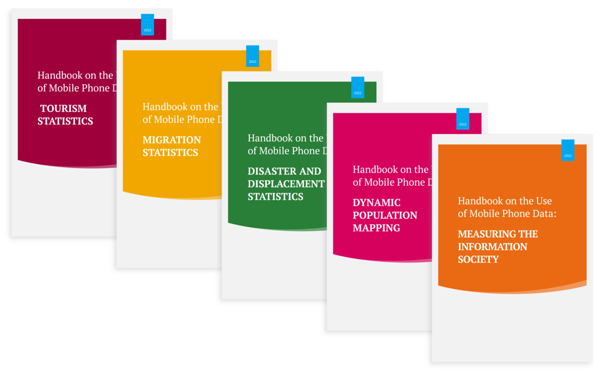Big data is a strategic national resource and the driving force behind the digital economy. It has grown our insights and helped us use our time and energy more effectively on all levels, from society and our government, down to our organisations and teams. The new handbooks focus on one type of big data - mobile phone data (MPD) - and aim to empower their users with knowledge of the state-of-the-art information on the use of mobile big data for statistics in various domains.
The handbooks are go-to materials for statisticians looking to employ mobile phone data for a variety of uses:
Dynamic population mapping using mobile positioning data
Mobile phone data for tourism statistics
Big data as a solution to fill data gaps for migration statistics
Handbook on disaster and displacement statistics
Measuring the information society using mobile phone data
“These handbooks show in very concrete terms how it is possible to actually use mobile phone data for a variety of policy indicators. With these handbooks, the Chief Statistician can convince the fellow Ministers of the feasibility and relevance of obtaining new, more detailed and more frequent indicators on population, tourism and information society,” says Ronald Jansen, Chief of the Data Innovation and Capacity Branch at the United Nations Statistics Division.
Data is the key to smart decisions
To meet the needs of societies today, the data we use for planning has to reflect the current state of the world. Governments are looking for new ways to make better use of the data at their disposal. Mobile phone data has proven to be a valuable source for decision making and driving societal change. Whether it be for more accurate demographic surveys, disaster response management, effectively putting funding where it is most needed and tracking its impact, as well as a host of other possibilities
. The benefits of this novel data source are manifold:
Sampling coverage – Did you know that there are more than 5 billion unique mobile subscribers worldwide? This means that MPD has one of the most extensive sampling coverage among data sources.
Timeliness – MPD can be generated in near real-time and offers a better sampling time period, allowing robust historical assessments of a phenomenon over time.
Data quality – The digital nature of MPD means that a certain degree of quality assurance is built into data collection and analysis.
Granularity – MPD also offers a better degree of data granularity in terms of the time period (daily/monthly/yearly) and geographical location (urban/rural). When combined with other reference datasets, MPD could offer other disaggregated data. For example, based on gender and income level.
In Estonia, mobile data has been used to drive effective decision making for over 10 years, resulting in world-class expertise and one of the most efficient governments in the world. In recent years, Indonesia and Oman have followed suit, and are leading the statistical revolution in South-East Asia and the Middle East respectively. This innovation has been led by Positium, who also contributed their expertise to the handbooks.
Statistical innovation at Expo 2020
With the help of the UN CEBD handbooks, statisticians around the world will be able to navigate the world of mobile phone data and tap into this valuable resource to improve statistics production in their respective countries. Through their use, UN CEBD hopes to increase the usage of mobile phone data for official statistics and to increase the quality of statistical production systems around the world.
Esperanza Magpantay (ITU), Lead of the UN CEBD MPD Task Team, comments on the importance of the new handbooks: “The Handbooks present methodologies to calculate several indicators but also non-technical considerations for accessing and processing mobile phone big data. The insights that are derived from this new data source will help fill data gaps and provide timely data to help monitor achievements of the SDGs.”
To hear more about the five brand new handbooks, join the UN CEBD on 26 January at Expo 2020 in Dubai for the Mobile Phone Data session, which is part of the “Bringing Big Data and Data Science Close to Home” event..png)
